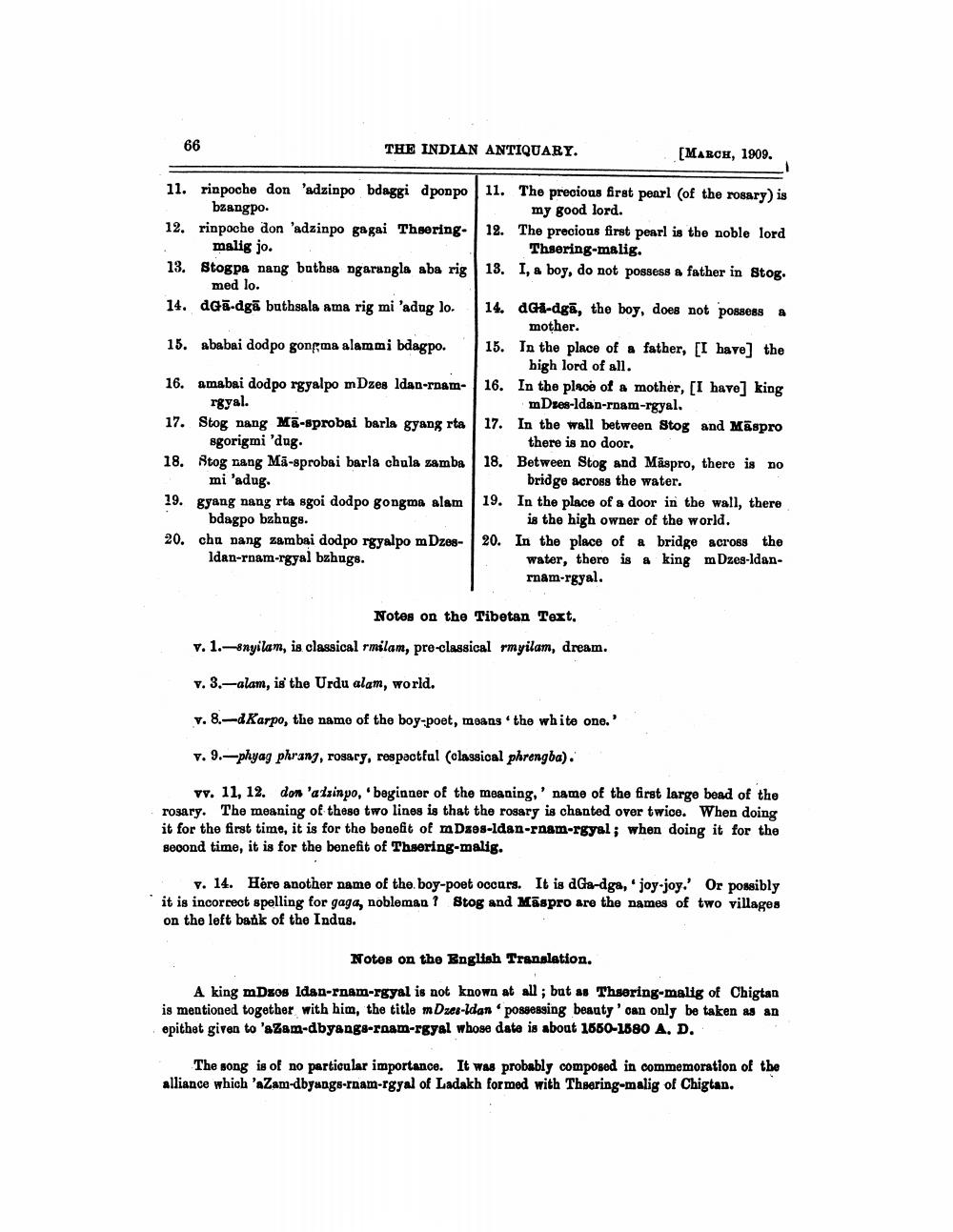________________
66
THE INDIAN ANTIQUARY.
[MARCH, 1909.
11. rinpoche don 'adzinpo bdaggi dpon po
bzangpo. 12. rinpoche don 'adzinpo gagai Theering.
malig jo. 13. Stogpa nang batha ngarangla aba rig
med lo. 14. Gā.dgã bathsala ama rig mi 'adog lo.
11. The precious first pearl of the rosary) is
my good lord. 12. The precious first pearl is the noble lord
Thsering-malig. 13. I, a boy, do not possess a father in Stog.
15. ababai dod po gongma alammi bdagpo.
16. amabai dod po rgyalpo m Dzes ldan-rnam-
rgyal. 17. Stog nang Mā-sprobai barla gyang rta
sgorigmi 'dug. 18. Stog nang Mā-sprobai barla chola zamba
mi 'adug. 19. gyang nang rta sgoi dodpo gongma alam
bdagpo bzhuge. 20. cha nang zambai dodpo rgyalpo m Dzes-
Idan-rnam-rgyal bzhugs.
14. Ga-dgā, the boy, does not possess a
mother. 15. In the place of a father, [I have the
high lord of all. 16. In the place of a mother, [I have] king
mDres-ldan-rdam-rgyal. 17. In the wall between Stog and Maspro
there is no door. 18. Between Stog and Mäspro, there is no
bridge across the water. 19. In the place of a door in the wall, there
is the high owner of the world. 20. In the place of a bridge across the
water, there is a king mDzes-ldanmnam-rgyal.
Notes on the Tibetan Text. v. 1.-nyilam, is classical rmilam, pre-classical rmyilam, dream.
v. 3.-alam, is' the Urdu alam, world.
v. 8.-Karpo, the name of the boy-poet, means the white one.'
v. 9.-phyag phrung, rosary, respectful (classical phrengba).
vv. 11, 12. don 'adsinpo, beginner of the meaning,' name of the first large bead of the rosary. The meaning of these two lines is that the rosary is chanted over twice. When doing it for the first time, it is for the benefit of na Daes-ldan-rnam-rgyal; when doing it for the second time, it is for the benefit of Thsering-malig.
v. 14. Here another name of the boy-poet oocars. It is dGa-dga, joy-joy.' Or possibly it is incorrect spelling for gaga, nobleman ? Stog and Māspro are the names of two villages on the left bank of the Indus.
Notes on the English Translation.
A king mDsos Idan-rnam-rgyal is not known at all; but as Thsering-malig of Chigtan is mentioned together with him, the title mDzes-Idan possessing beauty 'can only be taken as an epithet given to 'a Zam-dbyangs-roam-rgyal whose date is about 1850-1880 A, D.
The song is of no particular importance. It was probably composed in commemoration of the alliance which 'a Zam-dbyangs-rnam-rgyal of Ladakh formed with Theering-malig of Chigtan.




